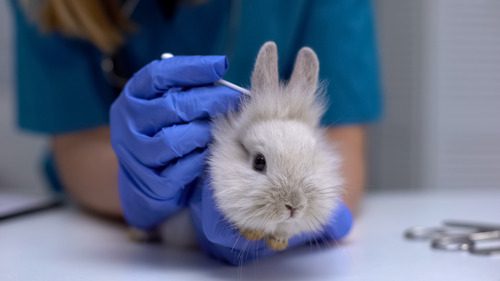Symptoms and Treatments for Ear Mites in Rabbits
Ear mites in rabbits are a common yet uncomfortable condition that can cause significant irritation and health issues if left untreated. These tiny parasites, scientifically known as Psoroptes cuniculi, thrive in a rabbit’s ear canal, feeding on skin debris and causing inflammation. If your rabbit is excessively scratching its ears, shaking its head, or showing signs of crusty buildup in the ears, an ear mite infestation may be the culprit. Call Keystone Animal Hospital at (941) 741-8445 to schedule an appointment today.

Understanding Ear Mites in Rabbits
Rabbits with ear mites can experience pain, swelling, and even hearing loss if the condition worsens. While ear mites are highly contagious among rabbits, they are usually species-specific and do not typically spread to other household pets. If you suspect your rabbit has ear mites, contacting your veterinarian for a proper diagnosis is the best course of action.
What Are Some Symptoms of Ear Mites in Rabbits?
Rabbits suffering from ear mites exhibit a variety of symptoms that can range from mild irritation to severe distress. Early detection is key to preventing the condition from escalating. Some of the most common signs of ear mites in rabbits include:
Excessive Scratching and Head Shaking
One of the first noticeable signs of ear mites in rabbits is persistent scratching around the ears. Because the mites cause intense itching, your rabbit may also shake its head frequently in an attempt to dislodge the parasites.
Crusty Buildup in the Ears
A hallmark symptom of ear mites in rabbits is the presence of thick, crusty lesions inside the ears. This buildup, which may appear as a brown or yellowish layer, consists of dried skin, earwax, and mite debris. As the infestation progresses, the crusts can spread from the ear canal to the outer edges of the ear.
Redness and Inflammation
Ear mites cause significant irritation to a rabbit’s delicate ear tissue. As a result, you may notice redness and swelling inside the ears. The inflammation can become so severe that the ear canal becomes partially or fully blocked, leading to discomfort and hearing difficulties.
Secondary Bacterial Infections
If left untreated, ear mites in rabbits can lead to secondary infections. Scratching and excessive irritation can break the skin, making the ears vulnerable to bacterial infections. Symptoms of an infection include foul-smelling discharge, pus formation, and increased sensitivity when the ears are touched.
Behavioral Changes
A rabbit suffering from an ear mite infestation may exhibit changes in behavior due to discomfort. Your rabbit may become lethargic, irritable, or less interested in eating and socializing. In severe cases, rabbits may develop a head tilt or lose their balance due to the effects on their inner ear.
How Ear Mites in Rabbits Are Diagnosed
Your veterinarian is the best resource for diagnosing ear mites in rabbits. If you notice any of the symptoms mentioned above, scheduling an appointment with a professional is crucial. The diagnosis process typically includes:
Physical Examination
Your veterinarian will conduct a thorough physical examination of your rabbit’s ears. The presence of crusty debris, redness, and inflammation can indicate an ear mite infestation.
Microscopic Analysis
To confirm the presence of mites, your veterinarian may take a sample of the debris from your rabbit’s ear and examine it under a microscope. Ear mites and their eggs are visible through microscopic analysis, which helps differentiate them from other ear-related conditions such as fungal or bacterial infections.
Rule Out Other Conditions
Some ear infections and skin conditions can mimic the symptoms of ear mites in rabbits. Your veterinarian will rule out other potential causes, such as yeast infections, allergies, or abscesses, to ensure the proper treatment plan is implemented.
Addressing Ear Mites in Rabbits
Once your veterinarian diagnoses ear mites, they will recommend an appropriate treatment plan. It is essential to follow professional guidance, as improper treatments can worsen the condition. Some common treatment methods include:
Veterinary-Approved Medications
The most effective treatment for ear mites in rabbits is veterinarian-prescribed medications. These medications may include topical or injectable antiparasitic treatments designed to eliminate mites at all life stages. It is crucial to follow dosage instructions carefully and complete the full course of treatment.
Cleaning the Ears
While it may be tempting to clean your rabbit’s ears at home, only your veterinarian should perform deep ear cleaning for an ear mite infestation. The buildup inside the ears is often painful, and attempting to remove it forcefully can cause additional irritation or damage.
Pain Management
In severe cases where ear mites cause significant discomfort, your veterinarian may prescribe anti-inflammatory or pain-relief medications. This helps alleviate irritation and allows the healing process to progress more smoothly.
Treating Other Pets
If you have multiple rabbits, they should all be examined and treated for ear mites, even if symptoms are not yet visible. Ear mites are highly contagious among rabbits, and treating only the visibly affected pet can lead to reinfestation.
What You Can Do to Help Prevent Ear Mites in Rabbits
Preventative measures can significantly reduce the risk of ear mite infestations in rabbits. Some of the best ways to protect your rabbit include:
- Regular Vet Checkups: Routine veterinary visits help detect early signs of ear mites before they become severe. Your veterinarian can also provide guidance on maintaining your rabbit’s overall ear health.
- Keeping Living Spaces Clean: Ear mites can spread through contaminated bedding, cages, and grooming tools. Regularly cleaning and disinfecting your rabbit’s enclosure can help prevent infestations.
- Avoiding Contact with Infected Animals: If you introduce a new rabbit into your household, a quarantine period is recommended. This helps prevent the transmission of ear mites and other contagious conditions.
- Monitoring for Symptoms: Early detection is the best defense against ear mites in rabbits. Regularly checking your rabbit’s ears for redness, buildup, or excessive scratching allows for prompt intervention before the infestation worsens.
When Is It Necessary to Seek Veterinary Care?
If your rabbit is displaying signs of ear mites, seeking professional veterinary care is the best way to ensure effective treatment. Delaying treatment can lead to complications, including secondary infections and long-term damage to the ears. If you suspect your rabbit has ear mites, contact Keystone Animal Hospital in Bradenton, FL, at (941) 741-8445 to schedule an appointment with your trusted veterinarian. With proper care and attention, your rabbit can recover from ear mites and return to a comfortable, healthy life.
